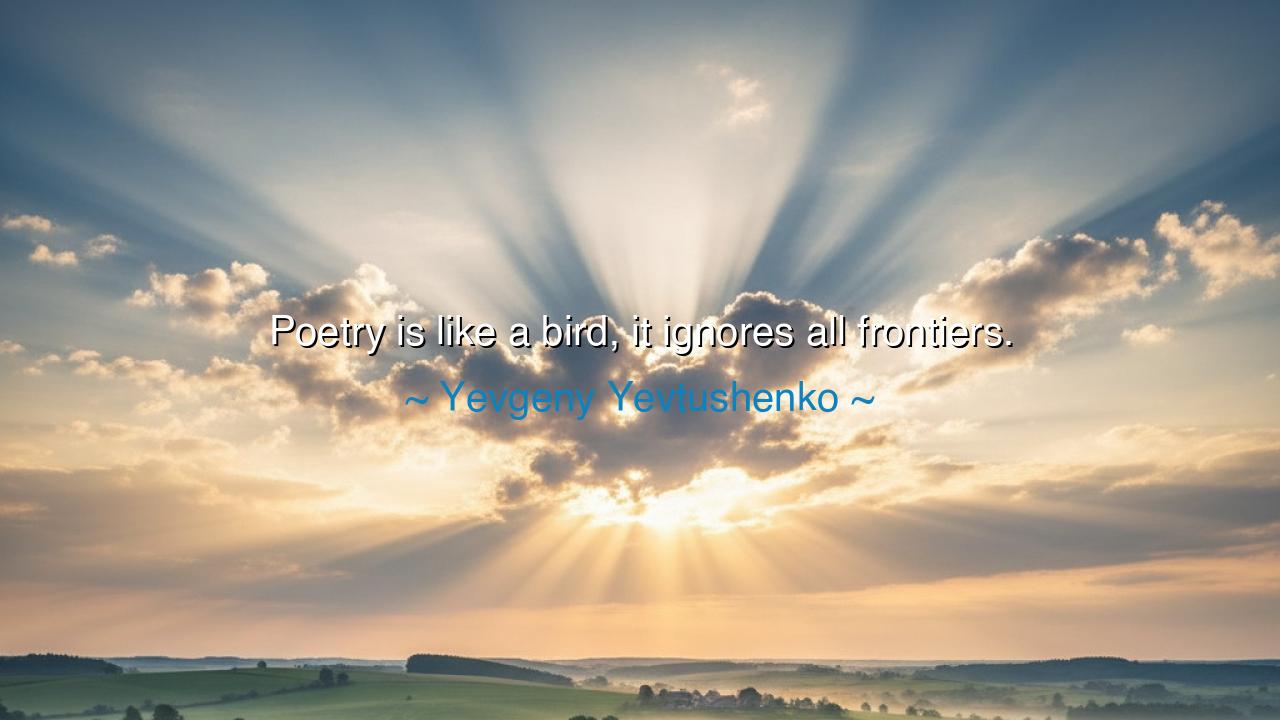
Poetry is like a bird, it ignores all frontiers.






In the luminous words of Yevgeny Yevtushenko, “Poetry is like a bird, it ignores all frontiers.” Here the poet gives wings to truth itself. He reminds us that while kings may draw borders and armies may guard them with steel, the spirit of poetry is untamable. Like a bird soaring over mountains and seas, poetry cannot be contained by barbed wire, censorship, or decrees. For language, once spoken from the depths of the human heart, travels freely from soul to soul, and no wall can halt its flight.
The origin of this thought lies in the life of Yevtushenko himself, a Russian poet who raised his voice in times of fear and repression. In the Soviet Union, censorship sought to bind words, to silence dissent, to imprison thought itself. And yet, through the rhythms of verse, truths were spoken that escaped the grasp of tyrants. Poetry became a bird carrying hope across borders of fear, lifting the hearts of those who longed for freedom. This was no idle metaphor for Yevtushenko—it was the testimony of his life.
Poetry has always defied boundaries. When the Hebrew psalms were sung by exiles by the rivers of Babylon, their laments leapt beyond captivity and carried the spirit of a scattered people. When the verses of Rumi were spoken in Persia, they crossed centuries and continents, igniting hearts from East to West. Even in times of conquest, when lands were divided and tongues forbidden, poetry soared above the conquerors, preserving culture, identity, and memory. Just as the bird flies without a passport, poetry flows without permission.
Consider also the story of Pablo Neruda of Chile, whose verses carried the struggles of the working class to the ears of the world. His poetry leapt beyond Chile’s borders, giving voice to the voiceless and stirring resistance far from his homeland. Or think of Anna Akhmatova, who, though silenced by Soviet terror, saw her poems whispered from memory, carried in secret, flying from one heart to another. Such is the eternal truth: rulers may command men, but they cannot command the bird-song of the poet.
The deeper meaning of Yevtushenko’s words is this: poetry unites where politics divides. Frontiers are the invention of men, but the cry of the soul knows no boundaries. Grief, joy, love, hope—these are not national, but human. Poetry gathers them and scatters them like seeds, so that they bloom in every land. The bird does not ask who owns the field where it lands; so too does poetry settle in every heart willing to hear.
The lesson for us is to recognize the freedom of our own words. Do not let fear or false borders silence your voice. Speak truth, write beauty, sing hope, even if you believe no one will hear—for like a bird, your words may fly farther than you imagine. Trust that what leaves your lips today may awaken a heart across seas or centuries. Poetry, once born, no longer belongs to you; it belongs to humanity, and it will find its own path.
Practically, this means cultivating openness to the voices of others as well. Read the poetry of other cultures, listen to songs beyond your language, and allow yourself to be lifted by words that cross borders. Share your own stories boldly, for they too may fly beyond your sight. In a world still fractured by divisions, let poetry be your winged messenger of peace, empathy, and truth.
Thus Yevtushenko’s wisdom takes root in us: poetry is like a bird—free, fearless, unbound. It reminds us that while walls may rise and empires may fall, the human spirit, through its art, remains unconquered. Let your words, then, take flight. Let them ignore frontiers. And let them sing into the vast sky of humanity, where all hearts can hear, and all souls may be stirred.






L712.Truong Si Dang lop 7/6
Yevtushenko’s quote paints a vivid picture of poetry as a free spirit, unconfined by borders. In a world filled with political and cultural divisions, does poetry really have the ability to transcend these barriers? Is it the poet’s role to write in a way that connects people across these divides, or is it up to the reader to open their minds and embrace the universal nature of poetry?
VHnguyen viet hung
The comparison of poetry to a bird ignoring frontiers feels incredibly powerful. It suggests that poetry has the power to fly beyond restrictions and touch hearts across all divides. But how often do we let our own personal 'frontiers'—whether cultural, ideological, or emotional—limit the impact of poetry? Can we truly allow poetry to soar if we are unwilling to listen beyond our own confines?
QNVo Thi Quynh Nhu
I love how Yevtushenko compares poetry to a bird, free from boundaries. This makes me think about how poetry can express universal human experiences, even in places where freedom of expression might be restricted. But is it always the case that poetry can break through all barriers, or are there moments when political or social boundaries still prevent its true meaning from being shared widely?
HY46. Vo Hai Yen
Yevtushenko’s metaphor of poetry as a bird that ignores frontiers is beautiful and thought-provoking. It suggests that poetry, much like nature, transcends boundaries—be they cultural, geographical, or even emotional. Can poetry truly overcome all these boundaries, or do certain limitations still affect how it’s received in different parts of the world? What does this mean for poets trying to reach a global audience today?